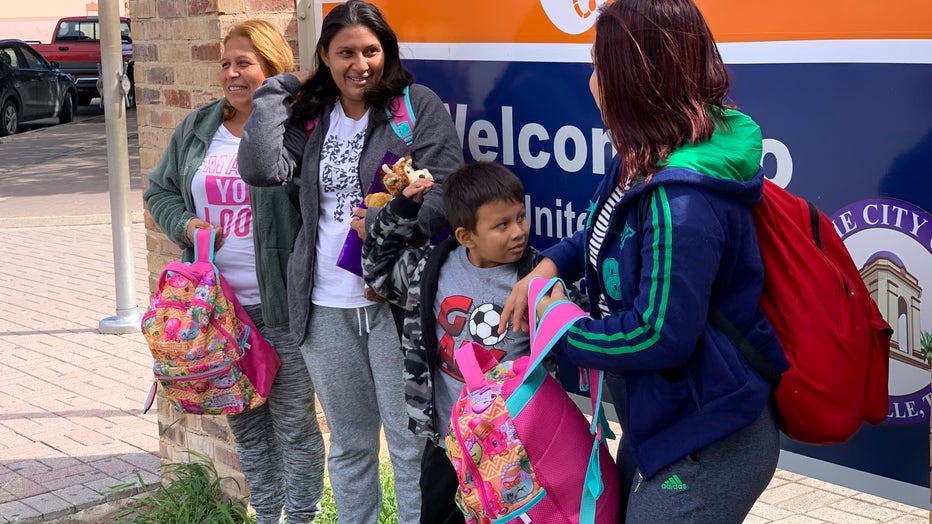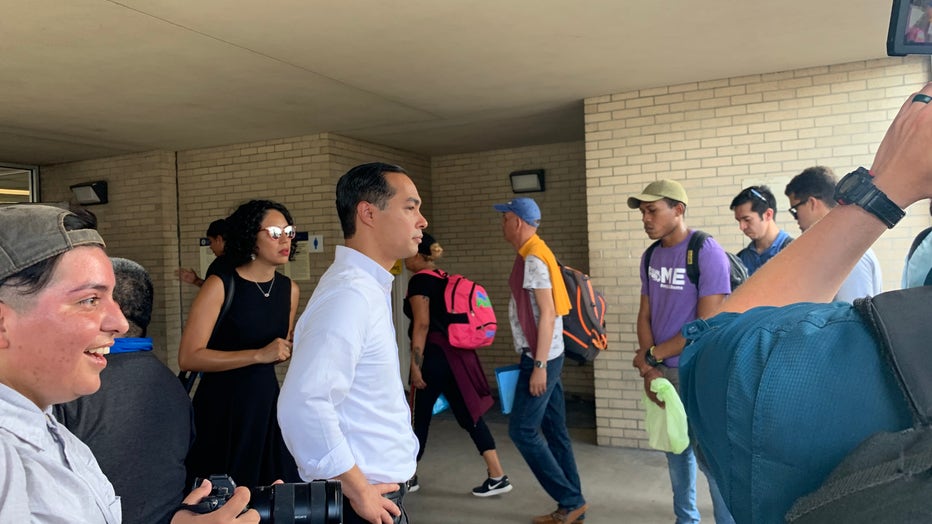CBP paroles deaf migrant, allowing her to wait out asylum process on US soil
BROWNSVILLE, Texas (Border Report) — There were plenty of hugs and tears as a deaf woman from El Salvador stepped on U.S. soil in for the first time Friday.
U.S. Customs and Border Protection paroled the woman and three family members, allowing them to legally remain in the United States while they await their asylum hearings.
The release of the woman — whose identity is not known and her lawyers requested to remain anonymous — is unusual when asylum-seekers are forced to remain in Mexico during their immigration hearings as part of President Donald Trump’s Migrant Protection Protocols (MPP) program, also known as Remain in Mexico.
The woman was among 12 migrants whom Democratic presidential candidate Julian Castro attempted to help cross into the United States from Matamoros, Mexico, when he visited the area on Oct. 7. But she and the 11 others later that afternoon were all returned to Mexico.
There are close to 2,000 MPP migrants currently living on the other side of the Gateway International Bridge in Matamoros, Mexico, in a filthy tent encampment while their await their U.S. asylum hearings.
But as the clock struck noon on Friday, the woman, her 5-year-old son, her mother and another woman emerged smiling and crying and hugging from the CBP offices at the Gateway International Bridge where they had papers officially releasing them into the United States during their immigration hearing process.
"They allowed this family to be paroled into the United States. They were taken out of MPP and it’s wonderful. CBP counsel authorized their parole," said Karla Vargas of the Texas Civil Rights Project, who was among the family’s pro-bono lawyers who fought for their release.
Vargas argued that under the Migrant Protection Protocols rules, migrants with disabilities are exempt from the program and should be allowed to remain in the United States during their immigration proceedings to access the necessary resources.
"This is a family with physical disabilities and it was particularly difficult for them to try and pursue their asylum case in any effective way, in particular, because of the disabilities this family faces. So we’re really happy and really grateful that CBP did exercise their discretion in this instance and did allow this family to be paroled into the United States," Vargas said just moments after emerging from the CBP port of entry on Friday.
No more details as to where the family will live or when their next asylum hearing is scheduled were provided.

The deaf woman from El Salvador, her mother, her 5-year-old son and another woman are shown moments after being paroled in the United States in Brownsville, Texas, on Friday, Oct. 25, 2019. (Border Report Photo/Sandra Sanchez).
"For now we’re just happy that they crossed and they don’t have to be back on the streets of Matamoros and that they can be a lot safer," said Charlene D’Cruz, of Wisconsin, who came to South Texas as part of the nonprofit organization Lawyers for Good Government and who has been spearheading legal services for the MPPs in Matamoros for a few weeks.
It was D’Cruz who first spotted this family and learned that the woman can only sign with the help of her mother. She does not sign in Spanish, but in a special language "they have made up together," Vargas told Border Report. The woman’s 5-year-old son also communicates with her in that language.
After hearing about the family’s release, Castro sent this response: "I am happy for her and her family. She never should have been sent to Mexico in the first place. In truth, no migrants seeking a better life in the United States through the asylum process should be over there. We need to end Remain in Mexico and give a fair hearing to asylum applicants."

Democratic presidential candidate Julian Castro is seen at the entrance to the Gateway International Bridge in Brownsville, Texas, on Oct. 7, 2019, where he tried to help 12 asylum-seeking migrants cross into the United States. Four of those migrants
Read a previous Border Report story on Castro’s visit here.
Erin Thorn Vela, a lawyer with the Texas Civil Rights Project, which is based in Alamo, Texas, beamed smiles as she walked with the family away from the bridge. "Today was a victory. It’s not always that case. Monday will return to fight another fight for these migrants," she said.
The fate of the nearly 2,000 migrants is uncertain as Mexican officials have repeatedly said they want them removed from the base of the Gateway International Bridge. Rumors had circulated that the entire group could be moved as early as Monday to a stadium about 6 miles south of the U.S.-Mexico border, where volunteers like Vargas said she cannot safely go.
But two days ago, a Mexican newspaper reported that government officials told them that location is not likely because it would disrupt scheduled events at the stadium.
On Friday, Horacio Duarte, Mexican Undersecretary of Labor who is Acting Immigration Commissioner for the Northern Border of Mexico, said there will not be a roundup, but a voluntary movement of the migrants.
"In Matamoros, we have a combination of Central American and Mexican migrants. What we are discussing now with INM (National Migration Institute), with the Ministry of Foreign Relations and, to a lesser degree with the (Tamaulipas) state government is where we can move them to," Duarte said. "Initially, we had talked about opening a full-service shelter such as Leona Vicario (shelter) in Ciudad Juarez, but the conditions are not there because of lack of security, lack of coordination with the state government, but that is a situation we have to face head on. We are not going to do it by force. I think it’s important to emphasize that. It will not be done by force, it will be done through a mechanism of dialogue and coordination. It will be temporary and it will be voluntary."
Read a Border Report story on the possible roundup of MPPs here.
Sandra Sanchez can be reached at SSanchez@BorderReport.com.
Visit the BorderReport.com homepage for the latest exclusive stories and breaking news about issues along the United States-Mexico border.

